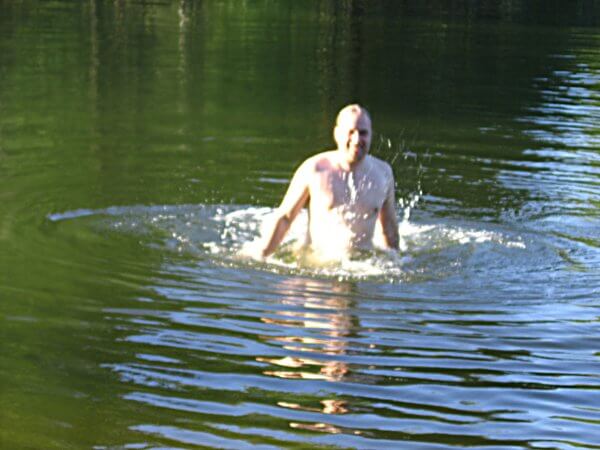I'm now one week into my summer holidays. Jee!

We spent some days at my (and also my wife's) parents in Pietarsaari. In the picture here I'm taking a swim in a small sandpit. The water was warmer than I expected. (Next day we went to the beach by the sea. No swimming there, it was still freezing enough to hurt my feet!)
I also spent one day together with Ignacio Correas, CEO of a Spanish Linux consultancy. He is in Finland due to his wife being from Northern Finland. It was a funny experience to sit with him at the beach in Pietarsaari. While this would be just everyday life in Helsinki, Pietarsaari is a small town and I'm not used to having coffee with somebody while speaking (in English - no less) about what Linux distributions you used 5 years ago. I think I know about 5 people living in Pietarsaari who could have an enlightened opinion about Linux. (I'm sure there are many I don't know, after all I moved away from there 10 years ago.) So it was a mixture of small town peace with some international nerdish gettogether.
I was lucky to find a good book to read just before the holiday started. The Long Tail: Why the Future of Business Is Selling Less of More, (accompanying blog).
It is written by Chris Anderson, who is Editor of Wired magazine. In it he present some interesting statistics on how the Internet has really changed laws of economics and retail. While traditionally businesses have been taught to focus on 20% of their products that generate more than 80% of the revenues, the book explains how this rule doesn't hold for modern online commerce. Chris presents statistics from Amazon, EBay, Netflix, Rhapsody, ITunes, Wikipedia and others, who all share a common form: About half of their revenues come from small sales of millions of products which only sell 10-1000 items each. This is the long tail, the richness of choice behind the few hit products we are used to seing promoted and sold.
I warmly recommend you to read this book if you didn't already. It perfectly explains the nature of the new landscape online businesses live in - and traditional business models have to compete with. I also found it a nice complement to my own book. While Open Life tries to present the richness created by the Internet and new business models coming from the Open Source camp, The Long Tail does the same based on facts and statistics - and manages to do so in a very compelling way.
While on that subject, Open Life and The Long Tail share an unlikely common theme: Farming subsidies. "So now, to prop up prices, we pay farmers not to plant their crops." It's on page 145 (you can search for the words in the phrase to get to the right page) and the argument being made is exactly the same as in Open Life. Scary :-) (I know what you're thinking, but The Long Tail was published before the English translation of Open Life, so unless he knows Finnish I'm pretty sure Chris came to make his remark independently.)
There was another amusing note in the book I instantly felt familiar with: "I tremble to think where the Dewey Decimal System will place the book you're reading right now. Technology? Economics? Business? Culture? None of them are quite righ by themselves. Sadly, there is no category for "all of the above"."
There should be a category for books on the topic of "How Internet is changing the world". You could use Wikipedia to figure out an available and suitable number code for it :-)
- Log in to post comments
- 9767 views
